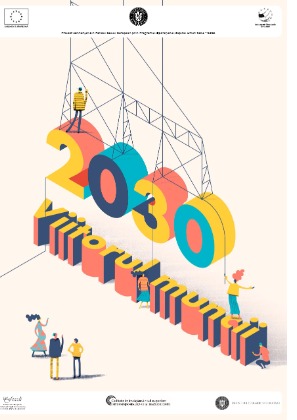Smart Futures Tunisia aims to explore what Tunisia and its digital economy could and should look like in 2035. For this purpose, normative future scenarios were created from which inspiring future job profiles could be derived. In a final step, recommendations identify options for action through which the envisioned future can be approximated.
The results are based on a three-stage methodology approach:
- First, key thematic areas were outlined through baseline research and expert interviews.
- Second, a foresight workshop was conducted to create a room to elaborate on different future scenarios and job profiles while also developing a digital skills map and initially discuss recommendations.
- Third, the results were refined through expert validation loops and expert interviews.
The future scenarios were created to explore what urban areas, smaller cities and rural areas might look like in 2035. A future is drawn in which Tunisia is characterized by smart and self-powered buildings, increasing e-mobility, and public services delivered digitally. Apart from that, digital progress offers the opportunity to provide more equitable education, to conduct various types of commercial activities via e-commerce, and to improve access to health. Such a future in its variety of facets has been visually depicted in the graphic above.
Furthermore, future job profiles are derived on this basis. In a desirable Tunisian development, these will be found primarily in the areas of food production, fintech, e-commerce, health tech, mobility, ed-, gov-, and green tech. Specific job profiles range from farm drone operators, who operate and maintain drones that monitor, measure and analyze crop growth and health, to cybersecurity experts, who protect government data from digital attacks. To be prepared for the changing profiles, digital competencies need to be developed, which can be categorized into the following four pillars: digital literacy and data literacy, technology-specific skills, digital product literacy, and digital transformation literacy.
After developing future scenarios and outlining future job profiles, recommendations were finally drawn up that will enable Tunisia to proactively strive for the future outlined. General recommendations manifest themselves, for example, in the promotion of a "digital culture" that includes all strata of the population in order to make appropriate use of the potential of digitization. A specific example of a topic area recommendation is to strive for leadership in green tech solutions. Here, it is recommended to promote green tech culture, for example by including environmental sustainability and green tech solutions in education and public campaigns. In addition to content recommendations, Foresight Journey recommendations aim to improve and deepen the methodological applications of foresight for potential future ventures in this thematic field.
Smart Futures Tunisia is part of the Special Initiative “Decent Work for a Just Transition” Invest for Jobs of the German Federal Ministry for Economic Cooperation and Development (BMZ) and implemented by the Digital Transformation Programme Tunisia of the Gesellschaft für Internationale Zusammenarbeit (GIZ) GmbH. Invest for Jobs aims to team up with companies to create good jobs in eight African partner countries and to improve local working conditions.



